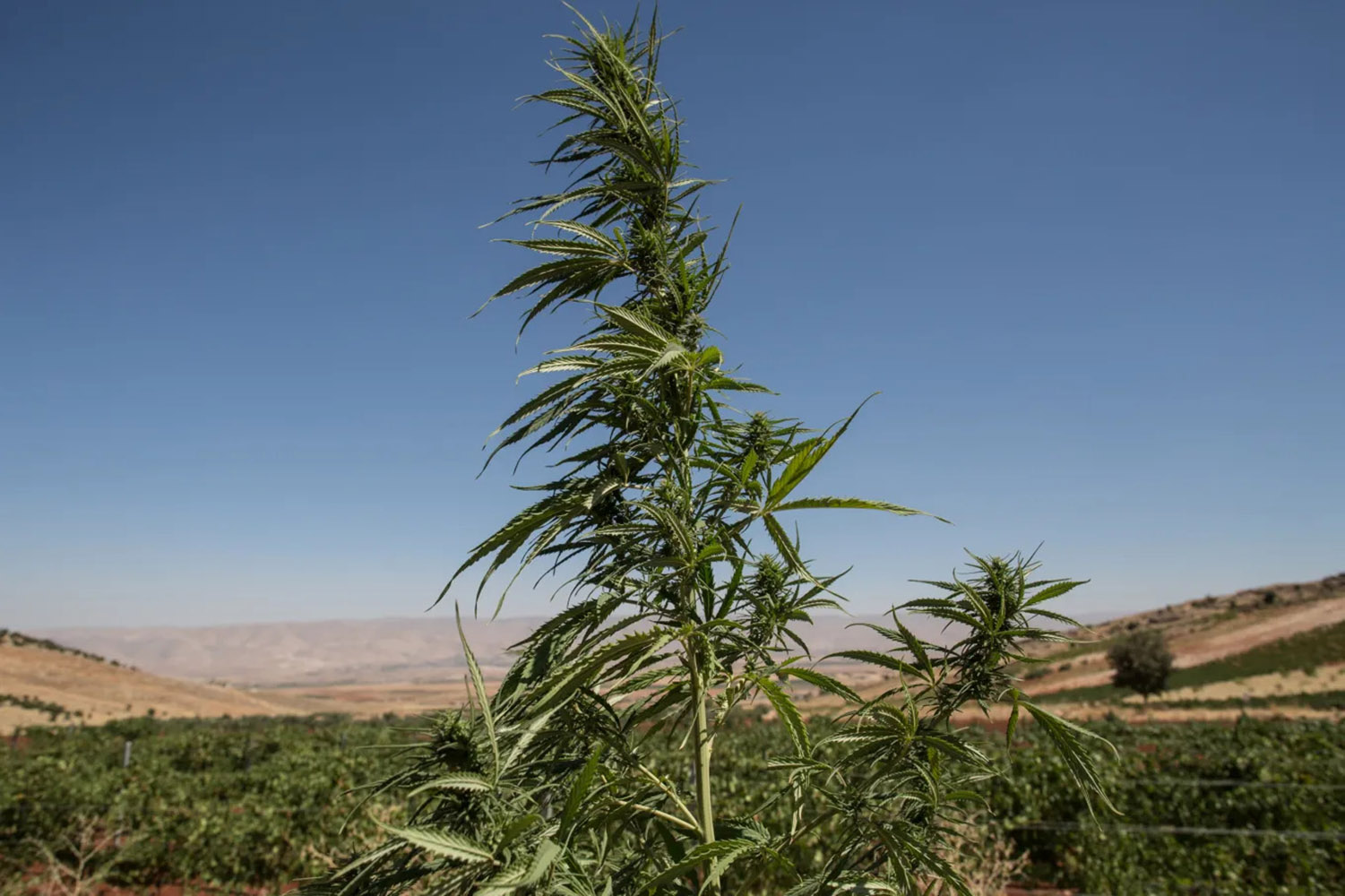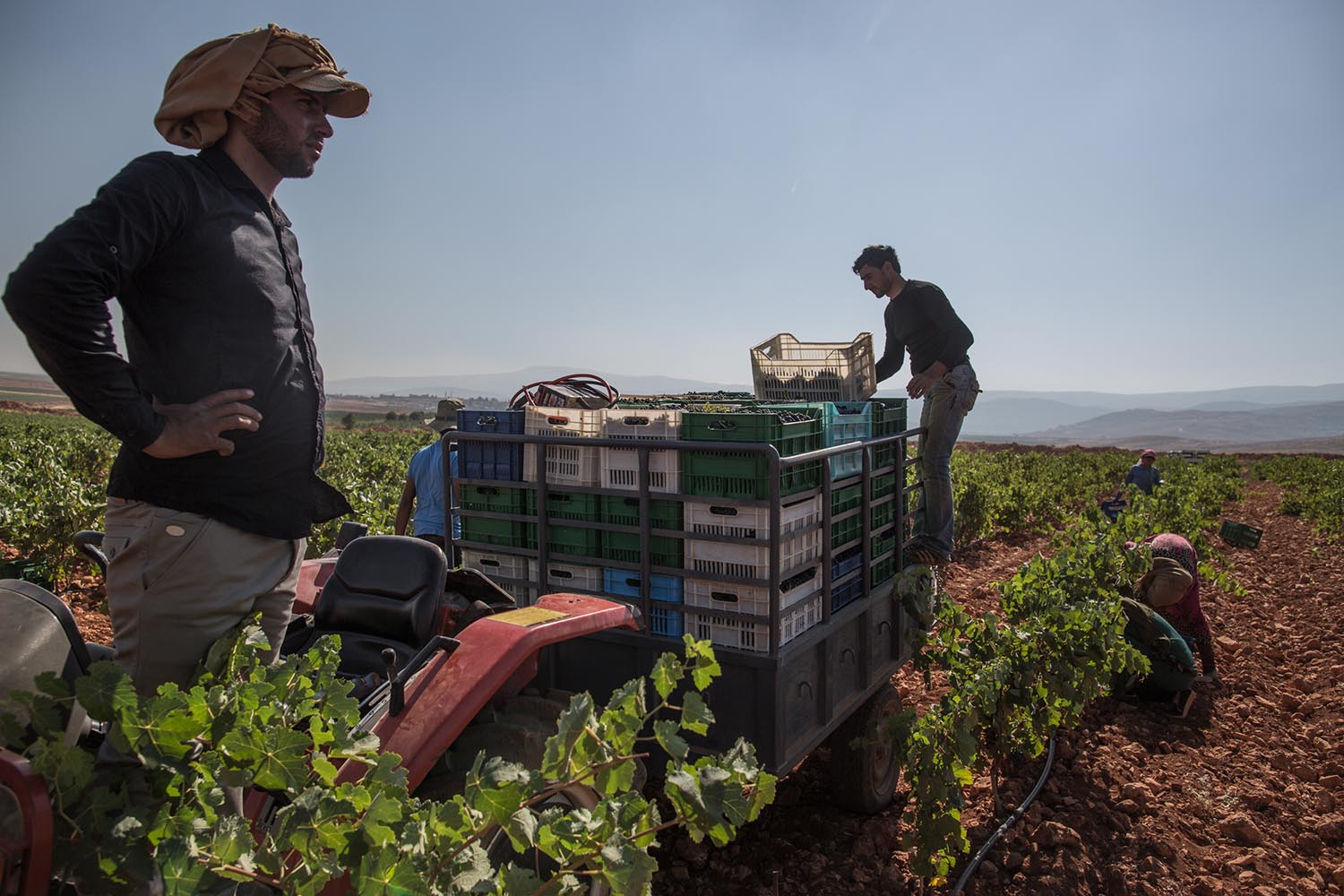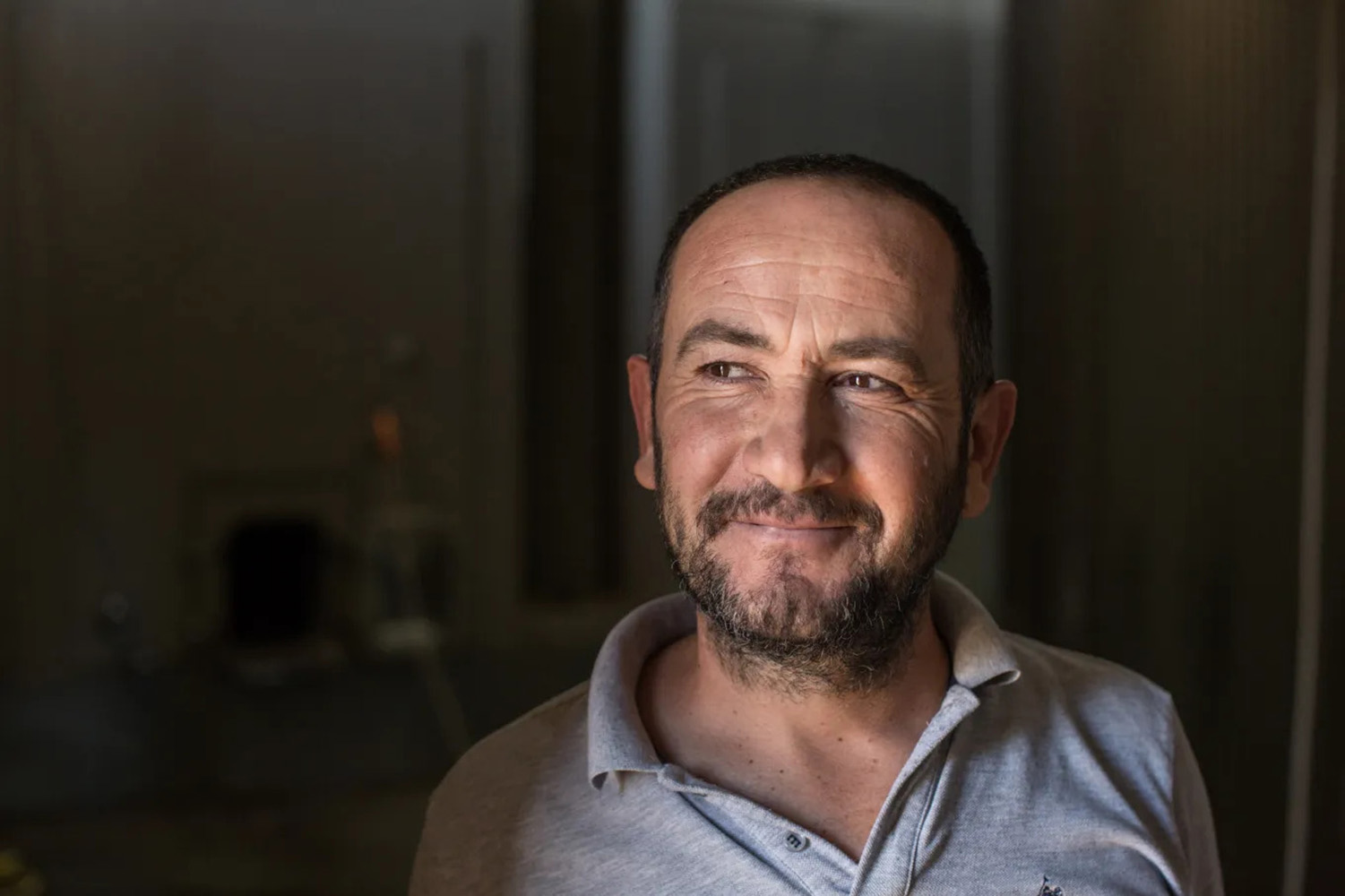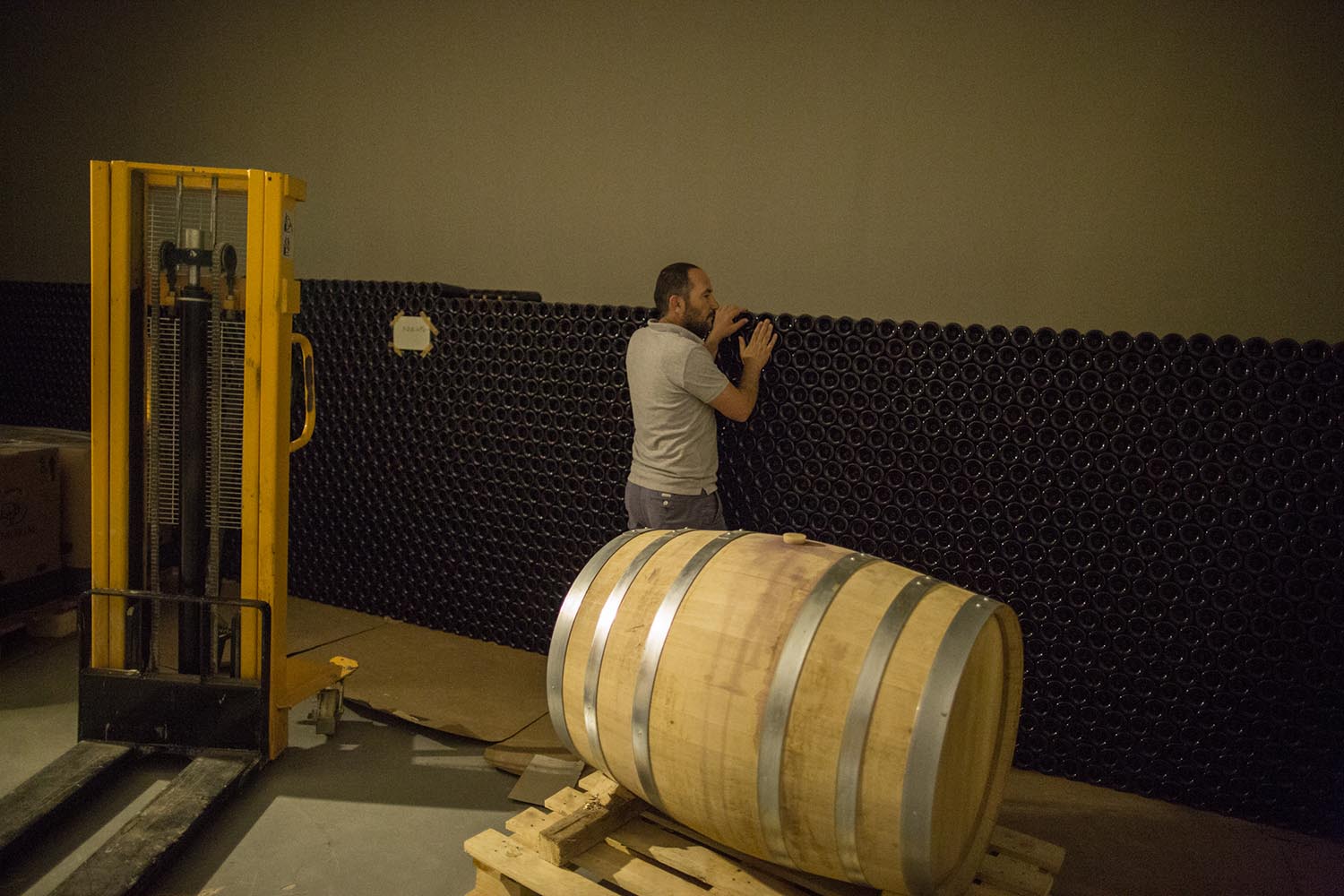Couvent Rouge
Lebanon | Bekaa Valley
Couvent Rouge is the story of a village that decided to replace its cannabis plantations with noble vine grapes. The winery is located in the depths of the Bekka Valley, just outside of a small town called Deir El Ahma. Farmers here used to grow cannabis and opium poppies destined for the hash and heroin trade. Now, they grow grapes: Cabernet Sauvignon, Syrah, Tempranillo, and more. Working together in the Cooperative Coteaux d’Heliopolis—or the “Heliopolis Cooperative,” inspired by the Hellenic name for Baalbek, a major nearby town—farmers in the area have been supplying grapes to Lebanon’s largest wineries since the early 2000s.
Today, the Fairtrade-certified cooperative gathers more than 200 farmers, with bio-certified vineyards, spreading on over 240Ha. Instead of selling raw materials to different Lebanese wine producers, two young and dynamic farmers, adherent to the cooperative, decided to give birth to the village’s wine by establishing Couvent Rouge, a modern and sophisticated winery that bears the name of its village.

The Cannabis and Opium Trade
People have been growing grapes and making wine in the Bekaa Valley for millennia. Adjacent to that, locals have also been planting much more potent—and lucrative—crops for centuries: cannabis and opium poppies. They increased production to meet export-driven demand after Lebanon became an independent state in 1943.
In the 1950s, with Lebanon emerging as a free-wheeling “merchant republic,” people found plenty of opportunities for debauched endeavours. Beirut boomed. It became a global centre for finance, trade, travel, and shipping; it also became a crime centre. With complicit bankers and officials, Lebanese criminals helped run some of the most prominent drug rings in the world—including, for instance, the infamous French Connection and ventures linked to the mafia.
The drug trade exploded in the 1970s and 1980s. Even as global consumers demanded more hash, heroin, and cocaine—driving up prices and profits—the state collapsed completely during the Lebanese civil war, which lasted from 1975-1991. Left to their own devices, farmers began cultivating more cannabis and opium. The Bekaa Valley became a drug lord’s paradise; drugs became its people’s petroleum.
Everyone wanted a cut. Rapacious militias and foreign armies controlled the Bekaa Valley, overland transit routes, and a dozen seaports to the wider world. Moving thousands of tons of hash, cocaine, and heroin, they pocketed hundreds of millions of dollars. Then, they used the money to buy guns, pay more gunmen, and fight each other. After the Syrian regime monopolized control of the Bekaa Valley, going so far as to send in units of its presidential guard, it stabilized the drug trade and began to benefit from billions of dollars in related revenue. By 1990, Lebanese farmers were producing 80 per cent of the world’s cannabis and a significant share of its opium poppies—leading the U.S. Congress to hold hearings on “the world’s largest drug farm.
After that, the authorities began serious eradication campaigns, in part to placate the Clinton administration, which was pushing for peace between Syria and Israel. They razed fields, burned crops, and shut down processing facilities. In 1997, the United States removed Lebanon from its list of narcotics-trafficking states.
But farmers couldn’t find adequate alternatives for their illicit crops, despite Lebanese and international attempts to help. Caught between aggressive eradication campaigns and ineffective crop-substitution initiatives, some farmers decided to grow grapes, turning weed into wine.

From Cannabis to Cabernet
Couvent Rouge winery is not a business, it’s a way of life for the people of Deir el Ahmar” declares Walid Habchi, Founder of the Heliopolis Coop and co-winemaker at Couvent Rouge.
With all that is going on with the eradication of Cannabis farming, it resulted in a mass exodus from the small villages to the towns and cities nearby in search of a more profitable way of life. And it was then, in the mid-90s, upon seeing the dwindling population of the village, plus the knowledge that the land could harvest far more than hashish or tobacco, that Walid, a farmer himself, was prompted to think about alternative crops to plant.
With a historical relationship to the vine that rivals the majority of the world’s wine-making regions, and the insight that indigenous varieties had been growing in the area for centuries, Walid and his colleagues were convinced that the vine was the way forward as a fruitful enterprise to help regenerate interest and income in the rural villages of the Northern Bekaa Valley.
In 2000, with the help of French consultants who assessed the microclimate, and performed studies on the land to check for the most suitable vine plantings and locations, the Heliopolis Cooperative came into being. A movement of uprooting the cannabis plants and replanting vines, to stop people from leaving their villages. In fact, they had people return back to their towns.
22 years later and with currently 250 farmers belonging to the Coop and over 250 ha of vines, his ideology of providing a more sustainable living for locals as well as encouraging better infrastructure to the area has become not only popular but sought after. There is now a renewed sense of pride in their land.

Although the native Obeidi grape was already being grown in the area, other grapes that were planted around 21 years ago have adapted well to the continental climate of the Northern Bekaa region.
The climate here is different to other parts of the Bekaa Valley which are wetter, more fertile and humid, often next to bodies of water. High altitude vines combined with hot summers, cool autumns and often harsh winters (characterised by substantial snowfall) make for bright, well rounded wines with distinct character and refreshing acidity. The terroir has a limestone dominance and the vineyards though high, are found on a 10km plain, protected from the winds by two mountain ranges.
The approach to growing as well as vinification is that of minimal intervention to show the true character of Lebanese wines and their terroir.
In 2010 Walid met Charbel Fakhry who shared similar philosophies about the region, its people and potential. They agreed to partner on a project that would see a physical winery being built and bespoke branding that fairly represented their values with a selection of wines of different levels of quality to suit the market.
Along with the inimitable help of Fawzi Issa of Domaines de Tourelles who has been Walid’s mentor during this project, the trio have left behind the advice of French consultants and have been plotting their own course for the future of the region and its vineyards. Vineyards now consist of grapes chosen specifically for the terroir and they are successfully trialing Grenache (blanc), Cinsault, Carignan, Tempranillo and Obeidi as well as Sauvignon Blanc and Viognier.

Walid considers himself, Charbel and Fauzi a part of “a new generation of winemakers”. The quality of their wine is important but also the notion of “moving people from an unstable life to one that is integrated in the law” is at the forefront of their ambitions.
The Heliopolis Coop and Couvent Rouge winery has given not only a new lease of life to the land in Deir el Ahmar and the surrounding regions, but also to the farmers there, and it serves as a model of encouragement for others to also start making their own wine.
Their range currently consists of 3 tiers of wine styles, plus a red and white pet nat. The goal is to produce delicious Lebanese wine of exceedingly good value. Check out their range below!

